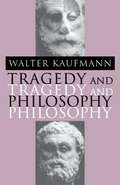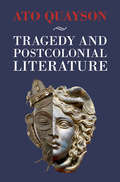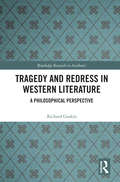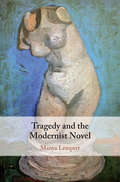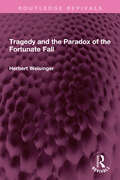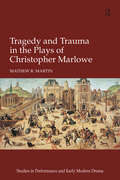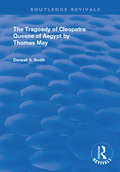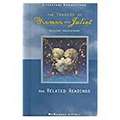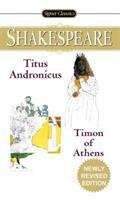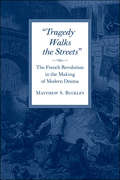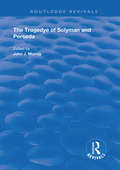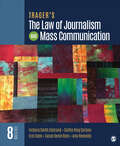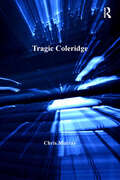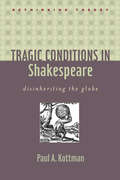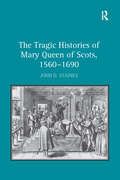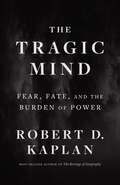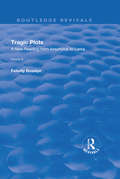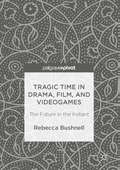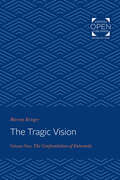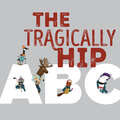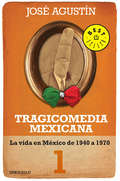- Table View
- List View
Tragedy And Philosophy
by Walter KaufmannA critical re-examination of the views of Plato, Aristotle, Hegel and Nietzsche on tragedy. Ancient Greek tragedy is revealed as surprisingly modern and experimental, while such concepts as mimesis, catharsis, hubris and the tragic collision are discussed from different perspectives.
Tragedy and Postcolonial Literature
by Ato QuaysonThis book examines tragedy and tragic philosophy from the Greeks through Shakespeare to the present day. It explores key themes in the links between suffering and ethics through postcolonial literature. Ato Quayson reconceives how we think of World literature under the singular and fertile rubric of tragedy. He draws from many key works – Oedipus Rex, Philoctetes, Medea, Hamlet, Macbeth, and King Lear – to establish the main contours of tragedy. Quayson uses Shakespeare's Othello, Chinua Achebe, Wole Soyinka, Tayeb Salih, Arundhati Roy, Toni Morrison, Samuel Beckett and J.M. Coetzee to qualify and expand the purview and terms by which Western tragedy has long been understood. Drawing on key texts such as The Poetics and The Nicomachean Ethics, and augmenting them with Frantz Fanon and the Akan concept of musuo (taboo), Quayson formulates a supple, insightful new theory of ethical choice and the impediments against it. This is a major book from a leading critic in literary studies.
Tragedy and Redress in Western Literature: A Philosophical Perspective (Routledge Research in Aesthetics)
by Richard GaskinThis book offers a unique interpretation of tragic literature in the Western tradition, deploying the method and style of Analytic philosophy. Richard Gaskin argues that tragic literature seeks to offer moral and linguistic redress (compensation) for suffering. Moral redress involves the balancing of a protagonist’s suffering with guilt (and vice versa): Gaskin contends that, to a much greater extent than has been recognized by recent critics, traditional tragedy represents suffering as incurred by avoidable and culpable mistakes of a cognitive nature. Moral redress operates in the first instance at the level of the individual agent. Linguistic redress, by contrast, operates at a higher level of generality, namely at the level of the community: its fundamental motor is the sheer expressibility of suffering in words. Against many writers on tragedy, Gaskin argues that language is competent to express pain and suffering, and that tragic literature has that expression as one its principal purposes. The definition of tragic literature in this book is expanded to include more than stage drama: the treatment stretches from the Classical and Medieval periods through to the early twentieth century. There is a special focus on Sophocles, but Gaskin takes account of most other major tragic authors in the European tradition, including Homer, Aeschylus, Euripides, Virgil, Seneca, Chaucer, Marlowe, Shakespeare, Corneille, Racine, Lessing, Goethe, Schiller, Kleist, Büchner, Ibsen, Hardy, Kafka, and Mann; lesser-known areas, such as Renaissance neo-Latin tragedy, are also covered. Among theorists of tragedy, Gaskin concentrates on Aristotle and Bradley; but the contributions of numerous contemporary commentators are also assessed. Tragedy and Redress in Western Literature: A Philosophical Perspective offers a new and genuinely interdisciplinary perspective on tragedy that will be of considerable interest both to philosophers of literature and to literary critics.
Tragedy and the Modernist Novel
by Manya LempertThis study of tragic fiction in European modernism brings together novelists who espoused, in their view, a Greek vision of tragedy and a Darwinian vision of nature. To their minds, both tragedy and natural history disclosed unwarranted suffering at the center of life. Thomas Hardy, Virginia Woolf, Albert Camus, and Samuel Beckett broke with entrenched philosophical and scientific traditions that sought to exclude chance, undeserved pains from tragedy and evolutionary biology. Tragedy and the Modernist Novel uncovers a temporality central to tragic novels' structure and ethics: that of the moment. These authors made novelistic plot the delivery system for lethal natural and historical forces, and then countered such plot with moments of protest - characters' fleeting dissent against unjustifiable harms.
Tragedy and the Paradox of the Fortunate Fall (Routledge Revivals)
by Herbert WeisingerFirst published in 1953, Tragedy and the Paradox of the Fortunate Fall argues that our response to tragedy is made up of a series of responses: the impact of experience which produces the archetypes of belief; the formation of the archetype of rebirth; the crystallization of the archetype of rebirth in the myth and ritual of the ancient Near East; the transformation of myth and ritual in the religions of the ancient world, including Christianity; the formalization of the archetype of rebirth into the concept of felix culpa, the paradox of the fortunate fall and finally the secular utilization of the paradox of the fortunate fall as the substance out of which tragedy is made. This book will be of interest to students of literature, philosophy and history.
Tragedy and Trauma in the Plays of Christopher Marlowe (Studies in Performance and Early Modern Drama)
by Mathew R. MartinContending that criticism of Marlowe’s plays has been limited by humanist conceptions of tragedy, this book engages with trauma theory, especially psychoanalytic trauma theory, to offer a fresh critical perspective within which to make sense of the tension in Marlowe’s plays between the tragic and the traumatic. The author argues that tragedies are trauma narratives, narratives of wounding; however, in Marlowe’s plays, a traumatic aesthetics disrupts the closure that tragedy seeks to enact. Martin’s fresh reading of Massacre at Paris, which is often dismissed by critics as a bad tragedy, presents the play as deliberately breaking the conventions of the tragic genre in order to enact a traumatic aesthetics that pulls its audience into one of the early modern period’s most notorious collective traumatic events, the massacre of French Huguenots in Paris in 1572. The chapters on Marlowe’s six other plays similarly argue that throughout Marlowe’s drama tragedy is held in tension with-and disrupted by-the aesthetics of trauma.
Tragedy in Ovid
by Dan CurleyOvid is today best known for his grand epic, Metamorphoses, and elegiac works like the Ars Amatoria and Heroides. Yet he also wrote a Medea, now unfortunately lost. This play kindled in him a lifelong interest in the genre of tragedy, which informed his later poetry and enabled him to continue his career as a tragedian - if only on the page instead of the stage. This book surveys tragic characters, motifs and modalities in the Heroides and the Metamorphoses. In writing love letters, Ovid's heroines and heroes display their suffering in an epistolary theater. In telling transformation stories, Ovid offers an exploded view of the traditional theater, although his characters never stray too far from their dramatic origins. Both works constitute an intratextual network of tragic stories that anticipate the theatrical excesses of Seneca and reflect the all-encompassing spirit of Roman imperium.
The Tragedy of Cleopatra: Queene of Aegypt (Routledge Revivals)
by Denzell S. SmithPublished in 1979: No earlier edition of this play offers a satisfactory text because an old-spelling critical edition requires a conflation of the author's autograph manuscript and the first printed edition of 1639. Further, this play, while illustrating Caroline skepticism concerning the character of a personage long famous in narrative and dramatic literature as well as in history, departs from the literary tradition of the preceding three centuries. An account of the reasons for its departure invites consideration of its sources, but more important, of the beliefs of the dramatist's contemporaries as shown in both life and literature.
The Tragedy of Romeo and Juliet
by Mcdougal LittelA textbook reader for young adults features William Shakespeare's "Romeo and Juliet," plus short stories, poems, and essays designed to build reading comprehension.
The Tragedy of Titus Andronicus: The Life of Timon of Athens
by William ShakespeareAs part of the Signet Classics Shakespeare Series edited by Sylvan Barnet of Tufts University, this edition includes commentaries on both plays as well as up-to-date production histories.
Tragedy Walks the Streets: The French Revolution in the Making of Modern Drama
by Matthew S. BuckleyTragedy Walks the Streets challenges the conventional understanding that the evolution of European drama effectively came to a halt during France's Revolutionary era. In this interdisciplinary history on the emergence of modern drama in European culture, Matthew S. Buckley contends that the political theatricality of the Revolution tested and forced the evolution of dramatic forms, supplanting the theater itself as the primary stage of formal development. Drawing on a wide range of texts and images, he demonstrates how the social and political enlistment of dramatic theatricality inflected rising social and political tensions in pre-Revolutionary France, shaped French Revolutionary political culture, conditioned British political and cultural responses to the Revolution, and served as the impetus for Büchner’s radical formal innovations of the 1830s. Setting aside traditional boundaries of literary scholarship, Buckley pursues instead a history of dramatic form that encompasses the full range of dramatic activity in the changing cultural life of the late eighteenth and early nineteenth century, including art, architecture, journalism, political performance, and social behavior. Surveying this expanded field of inquiry, Buckley weaves together a coherent formal genealogy of the drama during this period and offers a new, more continuous generic history of modern drama in its first and most turbulent phase of development.
The Tragedye of Solyman and Perseda: Edited from the Original Texts with Introduction and Notes (Routledge Revivals)
by John J. MurrayPublished in 1991 The Tragedye of Solyman and Perseda is a late Elizabethan romantic tragedy by Thomas Kyd, author of The Spanish Tragedy. It dramatises the triangular relationship of the Turkish emperor Soliman, his captive Perseda and her beloved Erastus against the fictionalised backdrop of the Turkish invasion of Rhodes in the early sixteenth century. This volume contains the original text along with textual and critical notes.
Trager′s The Law of Journalism and Mass Communication
by Victoria Smith Ekstrand Caitlin Ring Carlson Erin Coyle Susan D. Ross Amy ReynoldsTrager′s The Law of Journalism and Mass Communication provides a clear and engaging introduction to media law with comprehensive coverage and analysis for future journalists and media professionals. Grounded in the traditions and rules of law, along with fresh facts and examples, the authors demonstrate how the law functions in everyday life. The Eighth Edition of this bestselling text offers students a new breadth and diversity of material and brings the law to life with cutting-edge research, the latest court and legislative rulings, and a wealth of new content. Included with this title: LMS Cartridge: Import this title′s instructor resources into your school′s learning management system (LMS) and save time. Don′t use an LMS? You can still access all of the same online resources for this title via the password-protected Instructor Resource Site. Learn more.
Trager′s The Law of Journalism and Mass Communication
by Victoria Smith Ekstrand Caitlin Ring Carlson Erin Coyle Susan D. Ross Amy ReynoldsTrager′s The Law of Journalism and Mass Communication provides a clear and engaging introduction to media law with comprehensive coverage and analysis for future journalists and media professionals. Grounded in the traditions and rules of law, along with fresh facts and examples, the authors demonstrate how the law functions in everyday life. The Eighth Edition of this bestselling text offers students a new breadth and diversity of material and brings the law to life with cutting-edge research, the latest court and legislative rulings, and a wealth of new content. Included with this title: LMS Cartridge: Import this title′s instructor resources into your school′s learning management system (LMS) and save time. Don′t use an LMS? You can still access all of the same online resources for this title via the password-protected Instructor Resource Site. Learn more.
Tragic Coleridge
by Chris MurrayTo Samuel Taylor Coleridge, tragedy was not solely a literary mode, but a philosophy to interpret the history that unfolded around him. Tragic Coleridge explores the tragic vision of existence that Coleridge derived from Classical drama, Shakespeare, Milton and contemporary German thought. Coleridge viewed the hardships of the Romantic period, like the catastrophes of Greek tragedy, as stages in a process of humanity’s overall purification. Offering new readings of canonical poems, as well as neglected plays and critical works, Chris Murray elaborates Coleridge’s tragic vision in relation to a range of thinkers, from Plato and Aristotle to George Steiner and Raymond Williams. He draws comparisons with the works of Blake, the Shelleys, and Keats to explore the factors that shaped Coleridge’s conception of tragedy, including the origins of sacrifice, developments in Classical scholarship, theories of inspiration and the author’s quest for civic status. With cycles of catastrophe and catharsis everywhere in his works, Coleridge depicted the world as a site of tragic purgation, and wrote himself into it as an embattled sage qualified to mediate the vicissitudes of his age.
Tragic Conditions in Shakespeare: Disinheriting the Globe (Rethinking Theory)
by Paul A. KottmanPaul A. Kottman offers a new and compelling understanding of tragedy as seen in four of Shakespeare’s mature plays—As You Like It, Hamlet, King Lear, and The Tempest. The author pushes beyond traditional ways of thinking about tragedy, framing his readings with simple questions that have been missing from scholarship of the past generation: Are we still moved by Shakespeare, and why? Kottman throws into question the inheritability of human relationships by showing how the bonds upon which we depend for meaning and worth can be dissolved. According to Kottman, the lives of Shakespeare's protagonists are conditioned by social bonds—kinship ties, civic relations, economic dependencies, political allegiances—that unravel irreparably. This breakdown means they can neither inherit nor bequeath a livable or desirable form of sociality. Orlando and Rosalind inherit nothing "but growth itself" before becoming refugees in the Forest of Arden; Hamlet is disinherited not only by Claudius’s election but by the sheer vacuity of the activities that remain open to him; Lear’s disinheritance of Cordelia bequeaths a series of events that finally leave the social sphere itself forsaken of heirs and forbearers alike. Firmly rooted in the philosophical tradition of reading Shakespeare, this bold work is the first sustained interpretation of Shakespearean tragedy since Stanley Cavell’s work on skepticism and A. C. Bradley’s century-old Shakespearean Tragedy.
The Tragic Histories of Mary Queen of Scots, 1560-1690: Rhetoric, Passions and Political Literature
by John D. StainesAuthor John Staines here argues that sixteenth- and seventeenth-century writers in England, Scotland, and France wrote tragedies of the Queen of Scots - royal heroine or tyrant, martyr or whore - in order to move their audiences towards political action by shaping and directing the passions generated by the spectacle of her fall. In following the retellings of her history from her lifetime through the revolutions and political experiments of the seventeenth century, this study identifies two basic literary traditions of her tragedy: one conservative, sentimental, and royalist, the other radical, skeptical, and republican. Staines provides new readings of Spenser and Milton, as well as of early modern dramatists, to compile a comprehensive study of the writings about this important historical and literary figure. He charts developments in public rhetoric and political writing from the Elizabethan period through the Restoration, using the emotional representations of the life of this tragic woman and queen to explore early modern experiments in addressing and moving a public audience. By exploring the writing and rewriting of the tragic histories of the Queen of Scots, this book reveals the importance of literature as a force in the redefinition of British political life between 1560 and 1690.
The Tragic Mind: Fear, Fate, and the Burden of Power
by Robert D. KaplanA moving meditation on recent geopolitical crises, viewed through the lens of ancient and modern tragedy “Classical drama provides crucial lessons for policymakers. . . . A road map for effective, well-considered policy.”—Kirkus Reviews Some books emerge from a lifetime of hard-won knowledge. Robert D. Kaplan has learned, from a career spent reporting on wars, revolutions, and international politics in Europe, the Middle East, and East Asia, that the essence of geopolitics is tragedy. In The Tragic Mind, he employs the works of ancient Greek dramatists, Shakespeare, German philosophers, and the modern classics to explore the central subjects of international politics: order, disorder, rebellion, ambition, loyalty to family and state, violence, and the mistakes of power. The great dilemmas of international politics, he argues, are not posed by good versus evil—a clear and easy choice—but by contests of good versus good, where the choices are often searing, incompatible, and fraught with consequences. A deeply learned and deeply felt meditation on the importance of lived experience in conducting international relations, this is a book for everyone who wants a profound understanding of the tragic politics of our time.
Tragic Modernities
by Miriam LeonardUnder the microscope of recent scholarship the universality of Greek tragedy has started to fade, as particularities of Athenian culture have come into focus. Miriam Leonard contests the idea of the death of tragedy and argues powerfully for the continued vitality and viability of Greek tragic theater in the central debates of contemporary culture.
Tragic Pathos
by Dana Lacourse MunteanuScholars have often focused on understanding Aristotle's poetic theory, and particularly the concept of catharsis in the Poetics, as a response to Plato's critique of pity in the Republic. However, this book shows that, while Greek thinkers all acknowledge pity and some form of fear as responses to tragedy, each assumes a different purpose for the two emotions and mode of presentation and, to a degree, understanding of them. This book reassesses expressions of the emotions within different tragedies and explores emotional responses to and discussions of the tragedies by contemporary philosophers, providing insights into the ethical and social implications of the emotions.
Tragic Plots: A New Reading from Aeschylus to Lorca (Routledge Revivals Ser. #Vol. 9)
by Felicity RosslynThis title was first published in 2000. This book offers a wide-ranging account of tragic drama from the Greeks to Arthur Miller. It puts forward a bold and vigorously developed argument about the recurrent concerns of tragedy, and proposes to uncover the archetypal tragic plot that emerges at key points of historical transition. It traces this plot through fascinatingly diverse formations on Athens, Renaissance England and the modern world, and offers detailed analysis of over twenty plays. The needs of the first-time reader are not forgotten, while challenging new light is thrown on each period. There is substantial discussion of Aeschylus, Sophocles, Euripedes, Marlowe, Shakespeare, Ibsen, Strindberg, Chekhov, Lorca and Miller, along with briefer consideration of the Senecan tradition, Yeats, Synge, O’Neill and T.S. Eliot. Felicity Rosslyn asks why tragic plays get written when they do, and why they so often dramatise the struggle to break the ties of blood for the bonds of law.
Tragic Time in Drama, Film, and Videogames
by Rebecca BushnellThis book explores how classical and Shakespearean tragedy has shaped the temporality of crisis on the stage and in time-travel films and videogames. In turn, it uncovers how performance and new media can challenge common assumptions about tragic causality and fate. Traditional tragedies may present us with a present when a calamity is staged, a decisive moment in which everything changes. However, modern performance, adaptation and new media can question the premises of that kind of present crisis and its fatality. By offering replays or alternative endings, experimental theatre, adaptation, time travel films and videogames reinvent the tragic experience of irreversible present time. This book offers the reader a fresh understanding of tragic character and agency through these new media's exposure of the genre's deep structure.
The Tragic Vision: The Confrontation of Extremity
by Murray KriegerOriginally published in 1973. Literary critics who have studied tragedy and the tragic vision failed, in Murray Krieger's estimation, to define exactly what they saw as the tragic vision in general terms. An aim of his book is to create a tentative definition of tragic and to flesh out what the author sees as the definition most illuminating of modern literature and the modern mind. In order to do this, Krieger distinguishes between what he sees as the "tragic vision" and "tragedy"—tragedy, from his perspective, is an object's literary form, whereas tragic vision refers to a subject's psychology, the subject's view and version of reality. In light of the shriveling of the tragic concept in the modern world and the reduction of a total view to the psychology of the protagonist, Krieger contends that the protagonist in a tragedy is now more appropriately designated a "tragic visionary" than a "tragic hero."
The Tragically Hip ABC
by The Tragically HipA love letter to The Tragically Hip, one of Canada's most beloved bands, this ABC picture book features illustrations from four renowned Canadian illustrators.The Tragically Hip, fronted by the late Gord Downie, is a legendary, bestselling Canadian band. And now, almost forty years of music can be appreciated in a brand-new way: an ABC picture book! From "A is for Ahead by a Century" to "N is for New Orleans is Sinking" all the way to "Z is for Frozen in My Tracks," this illustrated ode to the band will be enjoyed by readers of all ages. Featuring art from Canadian illustrators Clayton Hanmer, Julia Breckenreid, Bridget George and Monika Melnychuk, this is the perfect gift for Hip fans old and new!
Tragicomedia mexicana 1: La vida en México de 1940 a 1970 (Tragicomedia mexicana #Volumen 1)
by José AgustínUna excepcional crónica de la vida social, política, cultural y económica en México de 1940 a 1970 En este primer volumen de la Tragicomedia mexicana, que comprende de 1940 a 1970, tenemos los grandes acontecimientos políticos, los modos del "tapadismo" y del fraude electoral, las leyes no escritas del sistema, los laberintos obreros y agrarios, el fortalecimiento de los empresarios, la industrialización, el desarrollo estabilizador, la penetración paulatina e invencible de Estados Unidos en casi todos los ámbitos del país, la eterna carestía, las protestas populares y la correspondiente represión, las estrellas de cine, los espectáculos y el deporte, el surgimiento y el predominio aplastante de la televisión, las grandes celebridades, la vida social, el mambo, el chachachá y el rocanrol, los rebeldes sin causa, las minifaldas, los jipis, las mafias culturales, la vida intelectual, el movimiento estudiantil y el fin del sueño del "milagro mexicano".
